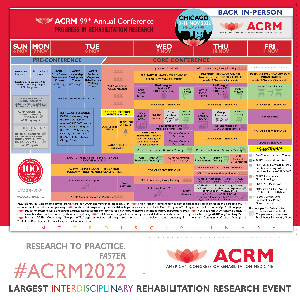Back
Brain Injury
Characteristics and Psychosocial Well-being of Caregivers of Veterans with TBI
Wednesday, November 9, 2022
10:01 AM – 10:06 AM
Location: Station 10

Jeanna M. Campbell
PhD Student
University of Illinois at Urbana Champaign
Urbana, Illinois, United States- CC
Chungyi Chiu, CRC, LPC
Associate Professor
University of Illinois Urbana-Champaign
Champaign, Illinois, United States
Presenting Author(s)
Research Objectives: The study has two aims: 1) To investigate the extent to which the veterans’ traumatic brain injury (TBI)-related changed behaviors are related to the spouse/partner caregiver’s psychosocial well-being in terms of spirituality, family happiness, depression, anxiety, and perceived stress. 2) To investigate caregivers’ demographic characteristics and caregiving situations in relationship to their perceptions of their care recipients’ post-TBI behaviors.
Design: Secondary cross-sectional survey study.
Setting: Participants were recruited nationally via flyers posted at Veterans Affairs (VA) clinics and on Facebook. Recruitment letters were also sent from a polytrauma outpatient clinic of a midwestern VA hospital.
Participants: Inclusion criteria for members of the parent study were (1) female (2) 18 years or older, and (3) wife or female partner caring for a male veteran diagnosed with a TBI within the past three months to 10 years.
Interventions: Not applicable.
Main Outcome Measures: The psychological spiritual subscale and the family happiness subscale of the Ferrans and Powers Quality of Life Index, Center for Epidemiologic Studies Depressive Symptoms Scale, Beck Anxiety Inventory, Perceived Stress Scale, and Key Behaviors Change Inventory.
Results: Caregivers who reported less changed behaviors in the partners with TBI reported higher levels of psychosocial well-being. Lower psychosocial well-being was associated with the interpersonal difficulties and unawareness of problems behaviors, younger age, and white race.
Conclusions: Younger caregivers who are white may be particularly vulnerable to the emotional and mental health consequences of caregiving. Practitioners should consider the impact of age and race on the experience of TBI-related behaviors in order to develop tailored interventions for these caregivers’ psychosocial well-being. Interventions that promote social capital may be particularly meaningful for this population.
Author(s) Disclosures: We have no known conflict of interest to disclose.
Design: Secondary cross-sectional survey study.
Setting: Participants were recruited nationally via flyers posted at Veterans Affairs (VA) clinics and on Facebook. Recruitment letters were also sent from a polytrauma outpatient clinic of a midwestern VA hospital.
Participants: Inclusion criteria for members of the parent study were (1) female (2) 18 years or older, and (3) wife or female partner caring for a male veteran diagnosed with a TBI within the past three months to 10 years.
Interventions: Not applicable.
Main Outcome Measures: The psychological spiritual subscale and the family happiness subscale of the Ferrans and Powers Quality of Life Index, Center for Epidemiologic Studies Depressive Symptoms Scale, Beck Anxiety Inventory, Perceived Stress Scale, and Key Behaviors Change Inventory.
Results: Caregivers who reported less changed behaviors in the partners with TBI reported higher levels of psychosocial well-being. Lower psychosocial well-being was associated with the interpersonal difficulties and unawareness of problems behaviors, younger age, and white race.
Conclusions: Younger caregivers who are white may be particularly vulnerable to the emotional and mental health consequences of caregiving. Practitioners should consider the impact of age and race on the experience of TBI-related behaviors in order to develop tailored interventions for these caregivers’ psychosocial well-being. Interventions that promote social capital may be particularly meaningful for this population.
Author(s) Disclosures: We have no known conflict of interest to disclose.
Learning Objectives:
- Identify which post-traumatic brain injury changed behaviors of Veterans are related to their informal caregivers' psychosocial well-being.
- Recognize the relationship between caregiver characteristics and psychosocial well-being for caregivers of Veterans with traumatic brain injury.
- Characterize family-centered, culturally sensitive interventions for families with young caregivers of Veterans with traumatic brain injury.

.jpg)
